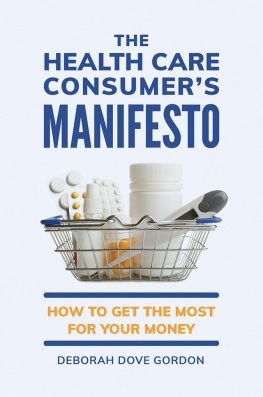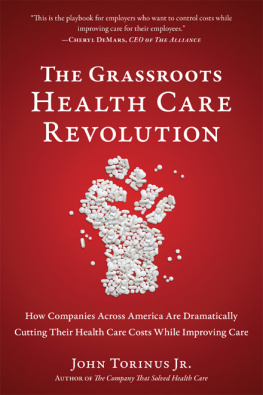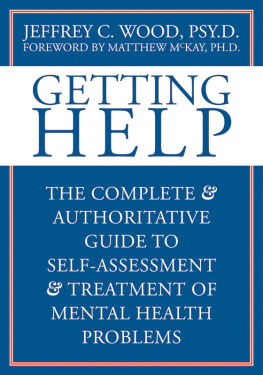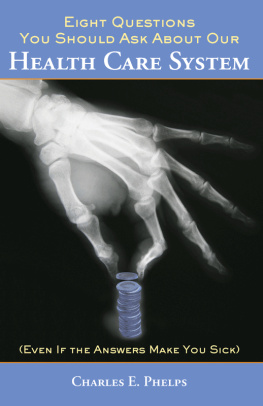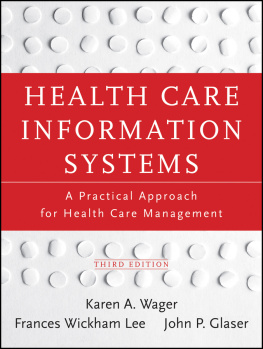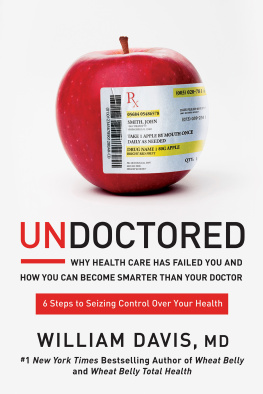Taking Charge of Your Health
Taking Charge of Your Health
A Guide to Getting the Best Health Care as You Age
John R. Burton, M.D. William J. Hall, M.D.

2010 The Johns Hopkins University Press
All rights reserved. Published 2010
Printed in the United States of America on acid-free paper
2 4 6 8 9 7 5 3 1
The Johns Hopkins University Press
2715 North Charles Street
Baltimore, Maryland 21218-4363
www.press.jhu.edu
Library of Congress Cataloging-in-Publication Data
Burton, John R.
Taking charge of your health : a guide to getting the best health care
as you age / John R. Burton and William J. Hall.
p. cm.
Includes index.
ISBN-13: 978-0-8018-9551-7 (hardcover : alk. paper)
ISBN-10: 0-8018-9551-0 (hardcover : alk. paper)
ISBN-13: 978-0-8018-9552-4 (pbk. : alk. paper)
ISBN-10: 0-8018-9552-9 (pbk. : alk. paper)
1. Older peopleMedical carePopular works.
I. Hall, William John, 1939 II. Title.
RA777.6.B87 2010
613.0438dc22 2009038871
A catalog record for this book is available from the British Library.
Special discounts are available for bulk purchases of this book. For more
information, please contact Special Sales at 410-516-6936 or
specialsales@press.jhu.edu.
The Johns Hopkins University Press uses environmentally friendly book
materials, including recycled text paper that is composed of at least 30 percent
post-consumer waste, whenever possible. All of our book papers are acid-free,
and our jackets and covers are printed on paper with recycled content.
To Americas seniors,
who deserve high-quality, comprehensive health care,
delivered with compassion
Contents
PART I
The Older Patient in Todays Health Care System
PART II
The Health Care System
PART III
Managing Your Health
Preface
Ask any of us what we value most as we age, and we are likely to mention good health. Our desire to remain healthy as we age often trumps our craving for financial security, housing, longevity, and in many cases, even life itself. The growing scientific exploration of aging has identified some of the predictors of good health. Key factors include our genetic inheritance, access to the health care system, personal health practices, and a substantial element of good luck. Because at present we cannot manipulate our genetic apparatus or our luck, we are well advised to concentrate on the other two elements: access to the health care system and personal health practices.
In this book we explain the sometimes arcane health care system currently available to seniors in the United States. To use this system in a way that maximizes our health, we must understand its strengths and weaknesses. The U.S. health care system has come a long way in understanding and caring for older people, but it is far from perfect or uniform in its delivery of that care. Seniors need to be able to differentiate the roles and expertise of physicians in primary care, geriatrics, specialties, and subspecial-ties. We need to understand the role of a consultant physician and his or her relationship with a generalist primary care physician. We must better understand how our physicians think and practice and become skillful communicators with our health care providers. We need to know more about our prescribed medications than ever before. Realizing that this information is hard to come by, we have written this book for older Americans who seek the latest and best information on how to maintain good health.
In addition to education about the health care system, this book offers advice on personal health practices. Today Americans are bombarded by guidance on successful aging, longevity, and anti-aging practices. Some sources are authoritative and excellent; others, sadly, can be classified only as snake oil, with little or no evidence to back up sometimes preposterous claims. In the third part of this book, we present a scientifically grounded life plan that we not only advise for our patients but also strive to live out for ourselves.
Who are we to presume on your time in these matters? Professionally, we are two physicians who have lived in the world of highly specialized medical care, then gravitated into general medicine, primary care, and ultimately to geriatrics. We have practiced medicine for many years and are both professors at U.S. medical schools. We have had the opportunity to teach and to learn from generations of young medical students, postgraduate trainees, and other health care professionals. Out of this decades-long process, we offer our perspective on the workings of this healing profession we love so well.
In our combined 140 years of life, we have also had occasion to be recipients of medical care. We have each personally experienced what it means to be an aging patient in the modern health care system. One gains a modicum of humility in the process.
When we began our collaboration on this book, our in cli-nation was to address our message to medical students and young physicians-in-training. After all, we have been privileged to spend most of our professional lives at two medical schools that have championed the doctor-patient relationship in teaching and role-modeling. However, we realized that the great debate about health care reform has devoted little attention to protecting the time and space for a caring physician to work in collaboration with an informed patient. Thus, while we trust our messages will resonate with our students and young physicians, we offer our thoughts first to all who are aging or who care about someone who is.
We hope you will approach this book as if the three of us were having a conversation, enjoying that most scarce commodity in modern health care: meaningful time together for the physician and patient. We offer insights gained from our many years of clinical experience so that seniors and their families may more fully understand the nuances of our complicated health care system and derive the best from it.
As for the final element of good healthluckwe have each had our share of both good and bad. Fortunately, the good has enabled us to spend our lives helping older adults attain and maintain good health to enjoy the abundant rewards of aging. We wish you the good luck and good health to confidently offer your creativity and wisdom to the world for years to come.
Acknowledgments
This book would not have been possible without the encouragement, support, and help offered by many people. First, we thank our patients, who over the years have taught us about medicine and life with all its trials, tribulations, and wonders. We cannot imagine a more rewarding professional life. Many of our colleagues have also been instrumental in helping us develop this book.
JRB:
I am indebted to my colleagues at Johns Hopkins, especially those based at the Johns Hopkins Bayview Medical Center, where I have spent my career and where Hopkins Geriatrics is based. This academic medical center has been a nurturing and stimulating environment. I have been surrounded by outstanding clinicians, teachers, and scientists, all focused on providing ideal health care to our community and beyond.
Among these colleagues, special tribute must be paid to my mentor and friend, Dr. Philip Zieve. As my departmental chair for twenty-five years, he has encouraged and guided my career at every step. He supported and nurtured my transition from specialty medicine to general internal medicine and then to geriatrics. He encouraged the development of programs to better serve seniors, including the reintroduction of house calls. His insight, integrity, dedication, vision, judgment, and compassion have guided me and many others. It has been a privilege to receive this exceptional mentorship.
Next page

